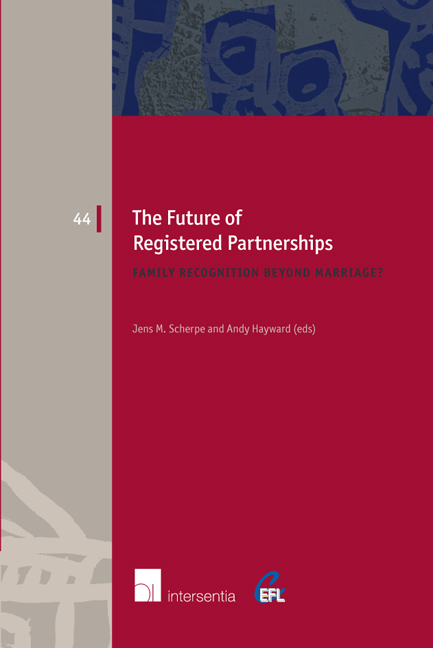Book contents
- Frontmatter
- Foreword
- Preface
- Contents
- List of Contributors
- The Future of Registered Partnerships: An Introduction
- Questionnaire
- Part I Registered Partnerships as a Functional Equivalent to Marriage
- Part II Registered Partnerships as an Alternative to Marriage
- Part III Registered Partnerships in a Time of Transition
- Part IV Alternative Models for Registered Partnerships: Beyond Conjugality, Beyond Formality
- Part V Registered Partnerships, Discrimination and Human Rights
- Part VI Comparative Perspective and Conclusions
- Index
- European Family Law Series
Preface
Published online by Cambridge University Press: 22 September 2018
- Frontmatter
- Foreword
- Preface
- Contents
- List of Contributors
- The Future of Registered Partnerships: An Introduction
- Questionnaire
- Part I Registered Partnerships as a Functional Equivalent to Marriage
- Part II Registered Partnerships as an Alternative to Marriage
- Part III Registered Partnerships in a Time of Transition
- Part IV Alternative Models for Registered Partnerships: Beyond Conjugality, Beyond Formality
- Part V Registered Partnerships, Discrimination and Human Rights
- Part VI Comparative Perspective and Conclusions
- Index
- European Family Law Series
Summary
This book analyses the legal recognition of family relationships between adults, irrespective of their legal gender, in the form of registered partnerships. Although the primary focus is on the formal recognition of these relationships, other forms of recognition are also considered. The aim of this book is to provide a broad and comparative basis for debates and law reform in this area. At the heart of these debates is the question: what is the nature, function and purpose of registered partnerships? As the contributions in this book reveal, the way jurisdictions have used registered partnerships to recognise family relationships varies greatly. After all, the answer to this question invariably is a political one: it can only be answered separately for each jurisdiction and only at the point in time when the question is being asked.
The original idea behind this project came in 2012. At that time England and Wales had just conducted a consultation on equal civil marriage, and by December that year the Government had pledged their support for its introduction. The Marriage (Same Sex Couples) Act 2013 followed, ushering in a significant change to the landscape of adult interpersonal relationships. After celebrations and the first ceremonies taking place in March 2014, we were left wondering what would happen to civil partnership, previously introduced through the Civil Partnership Act 2004. The messages as to its fate were mixed and the approach taken at the time by the Government had been an evasive one. Rather than confronting the issue of their abolition or retention head on, a consultation was conducted by the Department of Culture, Media and Sport in 2014. It was the methodological approach and ultimate findings of this consultation that motivated this project in the first place.
The short Report produced by the Department canvassed options for the future of civil partnership but, rather surprisingly, took a narrow, domestic law oriented and parochial view of these issues. No meaningful consideration was given to insights garnered from other European jurisdictions, let alone those further afield, or to the United Kingdom's obligations under the European Convention on Human Rights. Conceiving the reform of civil partnerships as a unique question for England and Wales overlooked the immense value of comparative family law scholarship.
- Type
- Chapter
- Information
- The Future of Registered PartnershipsFamily Recognition Beyond Marriage?, pp. vii - xPublisher: IntersentiaPrint publication year: 2017

